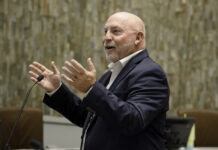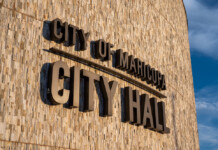
Two candidates for mayor and four for city council will be on the ballot for the city elections this spring.
The term for mayor is two years and four years for city council.
Running for mayor is Carl Diedrich, whose term on the city council expires next year, and Christian Price, a financial planner who is president of the Maricopa Meadow’s Homeowners’ Association.
Current Mayor Tony Smith is not running for reelection. Smith announced in the summer he will run for a seat on the Pinal County Board of Supervisors.
Four candidates are vying for three seats on the city council. They are incumbent Marvin Brown, Bridger Kimball, Leon Potter and Rosalin Sanhadja.
InMaricopa interviewed the candidates about their campaign plans and what they see as some of the important issues for the city.
“The next step is to get our message out, to talk to as many people as we can,” Diedrich said.
Diedrich, who owns a small marketing business, said job growth, economic development and education are important to Maricopa’s future.
“It is important to look at the needs of new businesses and for present businesses to expand,” he said.
Diedrich said he is meeting with small business owners, and, if elected, plans to establish a small business expert at city hall.
He said it’s vital to attract large companies whose employees will spend their incomes in the service sectors of Maricopa’s economy.
For education, Diedrich said he plans to create a mayor’s education panel that would include representatives from Maricopa Unified School District, local charter schools and nearby colleges to help develop ideas and partnerships.
Price said he is excited about running for mayor.
“I think at this point we will be getting through holidays and then do an all-out blitz come January,” Price said of his campaign.
Price said he wants to see more economic development.
“That is the No. 1 priority for everybody who lives here,” he said.
Brown, when asked about his campaign plans, got right to the point: “To win.”
Then he talked about the issues.
“We all agree that economic development is major issue and we’ve been scuffling with that for four years,” said Brown, who worked in state government in Michigan before moving to Maricopa.
Brown said a major problem facing the city is not having an overpass or underpass (grade separation) at the Union Pacific railroad crossing on North John Wayne Parkway.
“Until we get funding from the federal government, this is going to be a challenge,” he said. “(The lack of a grade separation) clearly presents a challenge if a train is crossing.”
Brown said estimates of the cost of the grade separation range between $60 million to $65 million, and both of Arizona’s U.S. senators (John McCain and Jon Kyl) have opposed funding it.
“But those are kinds of things citizens like to see,” he said. “As elected officials we agonize, but I continue to persevere and do everything I can.”
Brown said he is very pleased to be part of a government that has brought retail to Maricopa along with the Banner Health Center and new CAC campus. He added he is also proud of his role working with both of city’s neighboring Native American tribes, Ak-Chin and Gila River.
Kimball, co-owner of Caswell’s Shooting Range in Mesa, said his next step is to have a campaign committee meeting on Monday.
“We are not doing much for holidays, but after holidays we will be working a little bit harder,” he said.
Kimball said he has already held two fundraisers and one “meet and greet.”
“Right now, we are kind of relaxing but have another fundraiser in January and more endorsements coming,” said Kimball, who has been endorsed by local Republicans Sen. Steve Smith and Pinal County Supervisor Bryan Martyn.
If elected, Kimball said he’d like to work on the city’s economic development department and remove some of the barriers he believes are there.
“Obviously, it’s not a population issue because we have a very educated and able work force in Maricopa,” he said. “But we are dropping the ball on bringing jobs here.”
Kimball said bringing light industrial and office jobs to Maricopa will help make the city sustainable.
“It seems like every other week or so businesses are closing their doors,” he said.
While Kimball agrees that generally cities should not tell landlords what to do, he said he has talked to development directors from other cities in the Valley who say municipalities can play an important mediation role if they get involved.
“Moving forward with capital improvement projects is huge for our future,” he said.
Potter, who is director of the county’s volunteer tax preparation program, said economic development and education work hand in hand.
He pointed to the groundbreaking of the new CAC campus, which will not only bring jobs and growth but also more education opportunities to the city.



![In mayoral race, it’s the Nancy Smith show Maricopa Chamber of Commerce Executive Director Kelly Anderson grills incumbent Mayor Nancy Smith in election's first campaign event April 30, 2024, at Southern Dunes Golf Club. [Elias Weiss]](https://www.inmaricopa.com/wp-content/uploads/2024/04/CRM_1009-218x150.jpg)
![City gave new manager big low-interest home loan City Manager Ben Bitter speaks during a Chamber of Commerce event at Global Water Resources on April 11, 2024. Bitter discussed the current state of economic development in Maricopa, as well as hinting at lowering property tax rates again. [Monica D. Spencer]](https://www.inmaricopa.com/wp-content/uploads/2024/04/spencer-041124-ben-bitter-chamber-property-taxes-web-218x150.jpg)
![3 things to know about the new city budget Vice Mayor Amber Liermann and Councilmember Eric Goettl review parts of the city's 2024 operational budget with Mayor Nancy Smith on April 24, 2024. [Monica D. Spencer]](https://www.inmaricopa.com/wp-content/uploads/2024/04/spencer-042424-preliminary-budget-meeting-web-218x150.jpg)





![Maricopa restaurateur makes Food Network connection [Namkeen Dhaba]](https://www.inmaricopa.com/wp-content/uploads/2024/04/439456716_377105198650519_7536248579664805896_n-218x150.jpg)




![O’Reilly gears up for second Maricopa location An exterior view of O'Reilly Auto Parts on John Wayne Parkway on May 2, 2024.[Monica D. Spencer]](https://www.inmaricopa.com/wp-content/uploads/2024/05/spencer-050224-oreilly-second-location-web-100x70.jpg)